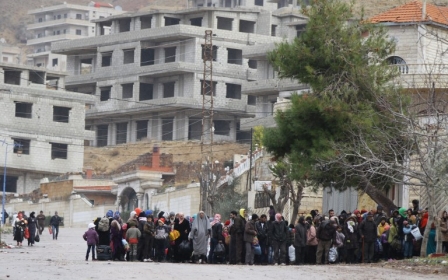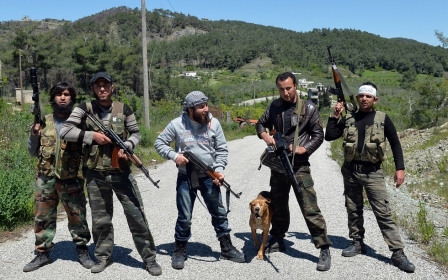Syrian Kurds use Russian and US support to make rapid advances

ERBIL, Iraq – They want Bashar al-Assad gone. They believe the opposition is worse than the government. And now the Syrian Kurds have seized on the support of both the US and Russia to attempt to extend their territory in the north of the country.
The Kurdish People's Protection Unit (YPG), fighting as part of the Syrian Democratic Forces (SDF), has had a string of successes in northern Syria in the last few days - mostly thanks to the Russian weakening opposition forces. But the Kurd's winning streak was originally due to the US, which chose to back the Kurds as the most effective force to counter the Islamic State militant group (IS), and saved Kobane from falling to the Islamic State group early last year.
This has given the Syrian Kurds the opportunity to maintain local administrations in what they call Rojava, or Syrian Kurdistan, the name they have given to areas in northern Syria where they have wrested control since the war began and aim to establish a federal state.
The Syrian Kurds are one group that has managed to navigate the shifting and complex alliances of the Syrian war. But their latest moves have threatened to drag in Turkey, who say their advances into non-Kurdish areas such as Azaz are a "red line". On Wednesday, Turkey's Deputy Prime Minister Yalcin Akdogan told local media that Ankara wanted to revive earlier plans to create of a secure 10km zone deep into Syria.
Now, under Russian air cover in northern Syria, the group says it is fighting militants to bring “democracy and freedom for the Syrian people”.
“We follow a third line in our politics: we are neither with the opposition nor with the regime,” said Sherzad Yazidi, a spokesman for the local Kurdish administrations in Rojava, based in Iraq.
“The aim is not Azaz or Tel Rifaat [some 10km further south], but rather to open a secure path for forces to reach Daesh [IS] and wage war on it,” said Ahmad Arag a spokesman for the YPG-allied Jaysh al-Thuwar (Army of Revolutionaries) in Syria.
Rebel fighters and even other Kurds, however, accuse the YPG of working closely with the Assad government and taking advantage of airpower from Russia, where they opened an office last week, for their own territorial aims.
String of successes
So far, the Islamist rebel groups backed by Turkish artillery have not been able to stop advances of the YPG in northern Aleppo. Despite the uniting of the rebels this week under the leadership of Ahrar al Sham’s former commander Hashem al-Sheikh, and Turkish support, the rebel defence lines around northern Aleppo are collapsing.
On Monday, alongside Jaysh al-Thuwar, which is part of the Syrian Democratic Forces (SDF) - a militia made up of Kurdish and Arab fighters - and backed by Russian air strikes, the YPG captured the town Tal Rifaat (some 10km north of Aleppo) from Turkish-backed rebels.
Located only 17 kilometers from the Turkish border, their advance came despite three consecutive days of Turkish artillery strikes that have continued on Wednesday.
“YPG have occupied Tal Rifaat - or we can say that the Russian air force have handed the town to YPG,” said Abdurahman Harkoush, a former spokesperson for the rebel group Jaish al-Islam, blaming Russian air strikes.
Moreover, rebel groups clashed with the SDF in the Kurdish-held Sheikh Maqsoud neighbourhood of Aleppo on Tuesday following ongoing clashes in the city’s Bustan al-Basha and al-Halak neighbourhoods that started on 11 February.
Then on Tuesday, the SDF forces reportedly reached an agreement to take over the town of Marea, one of the first towns that joined the armed uprising against Assad. So far, the Kurds have not taken over the city, but have threatened to take it if rebels do not concede.
“The YPG has a more effective command mechanism for coordinating its attacks,” said Nicholas A Heras, a Washington-based Middle East researcher at the Centre for a New American Security (CNAS).
“The Islamist rebel groups backed by Turkey have trouble uniting under a single leadership and to follow a command structure to coordinate their attacks,” he said.
The march to Azaz
With the capture of Tal Rifaat and the threats against Marea, the YPG edges closer both to the Turkish border and to the northern Syrian town of Azaz, which Turkish Prime Minister Ahmet Davutoglu says Ankara will not allow to fall.
Turkey opposes any form of Kurdish autonomy on its border as a result of YPG links to the militant Kurdistan Workers Party (PKK) that some believe may escalate its offensive against the Turkish government this spring.
Aymenn Jawad al-Tamimi, a fellow at US-based think tank the Middle East Forum said it would be difficult for Turkey to prevent the YPG advances, and the collapse of the Syrian rebel groups in the north of Aleppo, unless Turkey intervenes on the ground.
“In the case of north Aleppo, it's because the rebels are disorganised, fighting on multiple fronts and lack real air cover. Turkey seems scared of providing air support because it fears Russian airpower, so it resorts to artillery shelling. But this not enough,” said al-Tamimi.
The escalating tensions between Turkey and the YPG are also creating a strain between Ankara and Washington, all of which could soon come to a head in Azaz.
So far, it seems that the Russian air support for the YPG and Turkish rockets against the YPG have not changed US policy towards the group. It is most likely that the SDF, with the support of US, will carry out more operations around the eastern Syrian provinces of Raqqah, and Hassakeh soon.
The US will then need the YPG to fight IS in the two eastern Syrian provinces and, as a result, has tolerated YPG relations with Russia in the Aleppo region where the US has limited influence.
Meanwhile, Turkey wants the US to halt its cooperation with the group.
“The US policy in Syria and Iraq strictly focuses on defeating ISIS before Obama's term in the office comes to an end,” said Ceng Sagnic, a researcher with the Tel Aviv-based Moshe Dayan Center for Middle Eastern and African Studies.
“US opposition to Turkey's counter-measures against YPG is a key factor in this context. I assume Russia and the Syrian regime are also well-informed on this, and have been coordinating with YPG to advance into Azaz, since YPG is a US ally, and its relations with the US could prevent Turkey from further military action,” he said.
“The US knows it can't be an influential partner in western Syria due to the Russian presence there. By not allowing YPG to coordinate with Russia in this part of the country, they would demand [the] impossible and therefore risk relations with Syrian Kurds,” Sagnic added.
Therefore, it is no surprise that both France and the US have called on Turkey to stop shelling the Kurds and it’s unlikely, moving forward, that the US will change its alliance with the Kurds which has pushed Ankara to work closer with Russia’s enemies, he explained.
Rebels under pressure
The recent advances of the SDF, with the YPG at their side, have angered the Syrian’s main opposition bloc that participated in the recent Geneva peace talks.
Abdulhakim Bashar, a Kurdish member of the Syrian opposition’s High Negotiation Committee (HNC) who participated in the talks disagrees that the YPG, and the Democratic Union Party (PYD) are neutral.
“We as Kurds should not go there to create problems between Kurds and Arabs,” he told Middle East Eye.
“Why don’t they [YPG] liberate Qamishli [a Kurdish majority town seen as the capital of Rojava]? We can use this airport in our [Kurdish] area, why [did] they liberate the Mennagh airport [6km south of Azaz]? They are working for the regime,” he said.
With Russian air strikes, said former Islamic army spokesman, Abdurahman Harkoush, the YPG has been able to put pressure on rebels.
“They [rebels] are facing two powerful enemies supported by destructive air strikes,” he said. “The Russian airstrikes have played a decisive role in Aleppo battles.”
However, the YPG and its allies say their recent advances are part of their fight against militant groups, not Syrian opposition groups.
In Marea, for example, the Kurdish alliances want to remove militant elements such as Nusra Front that have attacked US-backed rebels such as Division 30 in the past, so that they can effectively battle IS and Nusra.
"On account of their disunity and Islamist thought, they [Syrian rebels] can no longer stand effectively in the face of Nusra or Daesh. As for the regime forces, they have caused havoc and corruption in most of the Syrian areas," said Ahmad Arag, a spokesperson for the YPG-allied Jaysh al-Thuwar in Syria.
"We want to go to Marea [a town a town 25km north of Aleppo] to wage war on Daesh while Nusra will either prevent us or stab us in the back,” said Arag.
“So we are heading to Ahras [a village between Aleppo and Tal Rifaat] and negotiating with our people in Marea and Azaz to expel Nusra [and Ahrar] from among their ranks.”
Meanwhile, for Marea’s rebels, their priority remains fighting Assad, and not Nusra or Ahrar al-Sham.
Middle East Eye propose une couverture et une analyse indépendantes et incomparables du Moyen-Orient, de l’Afrique du Nord et d’autres régions du monde. Pour en savoir plus sur la reprise de ce contenu et les frais qui s’appliquent, veuillez remplir ce formulaire [en anglais]. Pour en savoir plus sur MEE, cliquez ici [en anglais].




